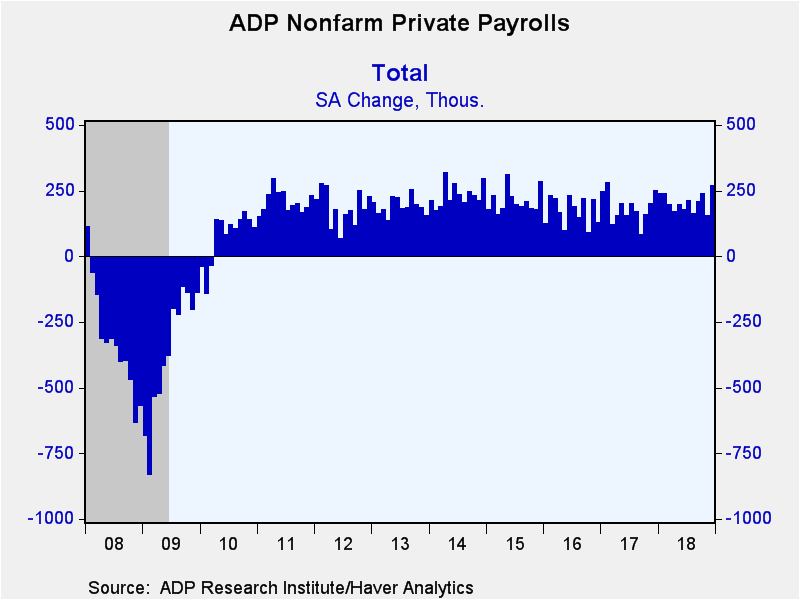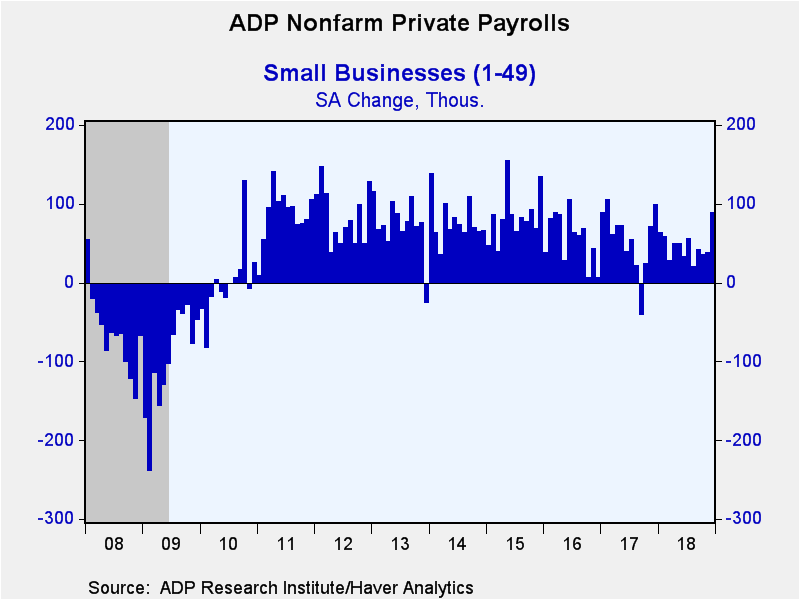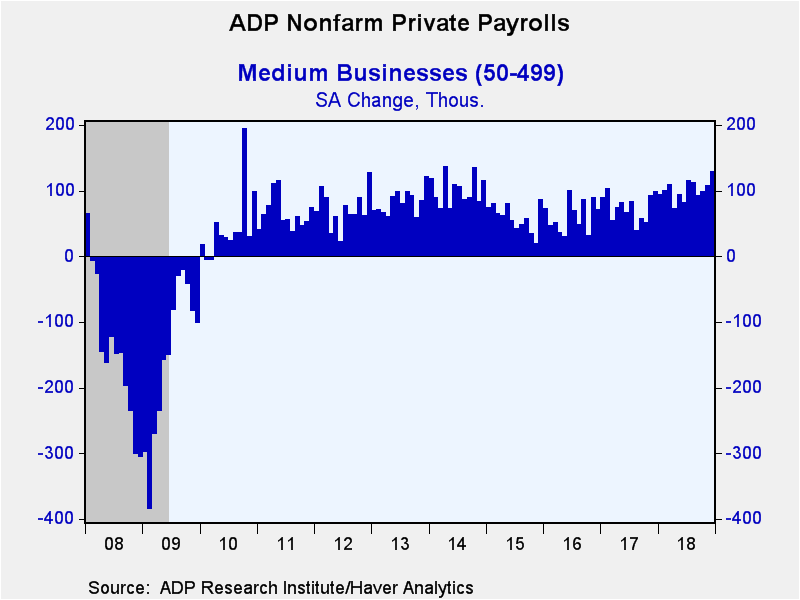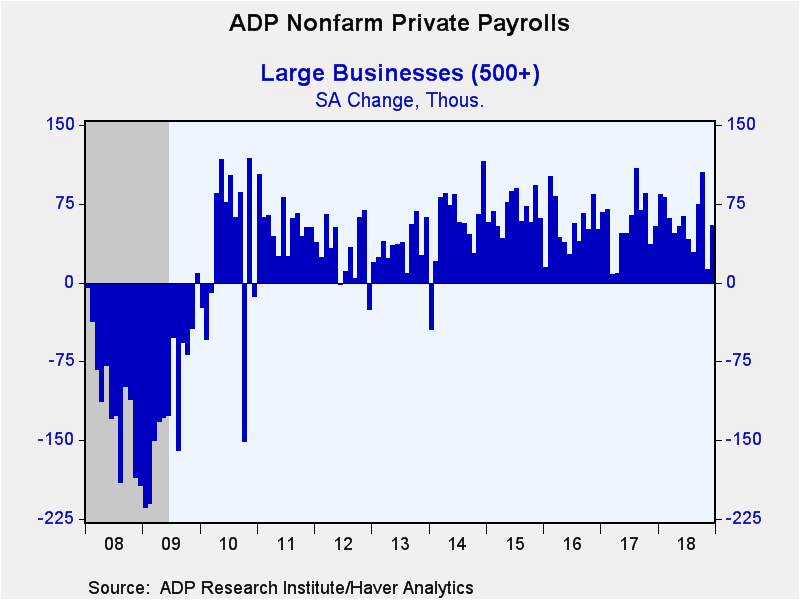 Global| Jan 03 2019
Global| Jan 03 2019U.S. ADP Private-Sector Payroll Increase Strengthens
by:Tom Moeller
|in:Economy in Brief
Summary
ADP reported in its National Employment Report that private nonfarm payrolls increased 271,000 during December following a 157,000 November rise, revised from 179,000. It was the largest increase since February 2017. During all of [...]
ADP reported in its National Employment Report that private nonfarm payrolls increased 271,000 during December following a 157,000 November rise, revised from 179,000. It was the largest increase since February 2017. During all of last year, payrolls rose a steady 1.9%. Expectations had been for a 180,000 December rise in the Action Economics Forecast Survey. During 2018, private nonfarm payrolls rose an average 206,000 per month versus 185,000 averaged in 2017. During the last ten years, there has been a 94% correlation between the change in the ADP figure and the change in nonfarm private-sector payrolls as measured by the Bureau of Labor Statistics.
The ADP National Employment Report is calculated from ADP's business payroll transaction system covering 411,000 companies and nearly 24 million employees. The data is calibrated and aligned with the Bureau of Labor Statistics establishment survey data and is produced by the Automatic Data Processing Research Institute in collaboration Moody's Analytics Inc. The ADP data only cover private sector employment.
Small business payrolls strengthened 89,000 (1.1% y/y) following a 38,000 rise. The three-month average gain of 54,000 compared to a January high of 78,000. Medium-sized payrolls gained 129,000 (2.7% y/y) and an improved 112,000 on a three-month basis. Large payrolls rose a strengthened 54,000 m/m (2.5% y/y) and a steady 57,000, on average, during the last three months.
Goods-producing payrolls increased 47,000 (2.3% y/y) in December, improved versus 33,000 on a three-month basis. Construction sector payrolls rose 37,000 (3.0% y/y), up from the 21,000 three-month average change. Manufacturing sector employment gained a steady 12,000 (1.6% y/y). Natural resource and mining sector payrolls eased 2,000 (+7.0% y/y) and rose by a greatly lessened 2,000 average during the last three months.
Private-service sector payrolls strengthened 224,000 (1.9% y/y), the largest increase since June 2016. Three-month average growth was an improved 189,000. Professional and business services payrolls strengthened 66,000 (2.8% y/y), up from the 54,000 three-month average. Jobs in education health services rose a strengthened 61,000 (2.1% y/y). Leisure & hospitality employment gained an improved 39,000 (2.1% y/y). Trade, transportation & utilities employment increased a lessened 33,000 (1.3% y/y). Employment in the financial services sector rose a steady 7,000 (1.5% y/y), and information sector employment rebounded 6,000 (0.3% y/y) after a 2,000 decline.
The ADP National Employment Report data can be found in Haver's USECON database; historical figures date back to April 2001 for the total and industry breakdown, and back to January 2005 for the business size breakout. The expectation figure is available in Haver's AS1REPNA database
| ADP/Moody's National Employment Report | Dec | Nov | Oct | Dec Y/Y | 2018 | 2017 | 2016 |
|---|---|---|---|---|---|---|---|
| Nonfarm Private Payroll Employment (m/m chg, 000s) | 271 | 157 | 239 | 2.0% | 1.9% | 1.8% | 1.9% |
| Small Payroll (1-49) | 89 | 38 | 36 | 1.1 | 1.1 | 1.3 | 1.9 |
| Medium Payroll (50-499) | 129 | 108 | 98 | 2.7 | 2.3 | 1.9 | 1.5 |
| Large Payroll (>500) | 54 | 12 | 105 | 2.5 | 2.6 | 2.3 | 2.7 |
| Goods-Producing | 47 | 13 | 40 | 2.3 | 2.3 | 1.5 | 0.8 |
| Construction | 37 | 9 | 17 | 3.0 | 2.9 | 3.1 | 4.3 |
| Manufacturing | 12 | 2 | 19 | 1.6 | 1.6 | 0.7 | 0.2 |
| Service-Producing | 224 | 144 | 199 | 1.9 | 1.8 | 1.8 | 2.2 |
Tom Moeller
AuthorMore in Author Profile »Prior to joining Haver Analytics in 2000, Mr. Moeller worked as the Economist at Chancellor Capital Management from 1985 to 1999. There, he developed comprehensive economic forecasts and interpreted economic data for equity and fixed income portfolio managers. Also at Chancellor, Mr. Moeller worked as an equity analyst and was responsible for researching and rating companies in the economically sensitive automobile and housing industries for investment in Chancellor’s equity portfolio. Prior to joining Chancellor, Mr. Moeller was an Economist at Citibank from 1979 to 1984. He also analyzed pricing behavior in the metals industry for the Council on Wage and Price Stability in Washington, D.C. In 1999, Mr. Moeller received the award for most accurate forecast from the Forecasters' Club of New York. From 1990 to 1992 he was President of the New York Association for Business Economists. Mr. Moeller earned an M.B.A. in Finance from Fordham University, where he graduated in 1987. He holds a Bachelor of Arts in Economics from George Washington University.
More Economy in Brief
 Global| Feb 05 2026
Global| Feb 05 2026Charts of the Week: Balanced Policy, Resilient Data and AI Narratives
by:Andrew Cates










